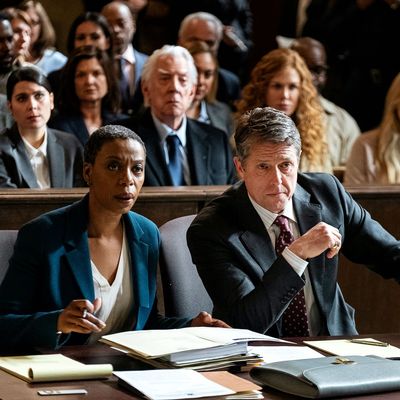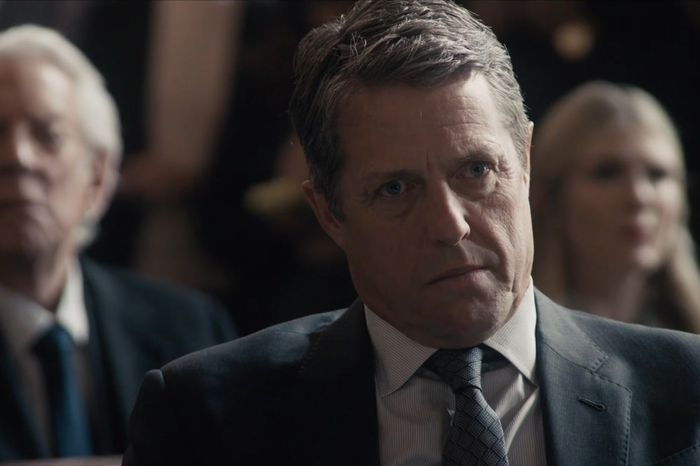
What does it say about the season finale of The Undoing that my biggest post-episode questions revolve around whether Henry Fraser would really know how to use a dishwasher, and what the odds were in Las Vegas for bets on Jonathan’s innocence or guilt, and how much it costs to have a personal helicopter pad in New York City, and whether Grace Fraser has a personal shopper, or if she collects all these delightfully impractical velvet dusters and embroidered robes herself? Those are ancillary musings because the central mystery of The Undoing didn’t really turn out to be a mystery at all: Yes, Jonathan Fraser killed his lover, Elena Alves. What we all assumed from the beginning ended up being the truth, and I must admit, I’m a little bummed my elaborate theory from last week’s recap about a vengeful Franklin sending a hitman after an escaped Jonathan didn’t come to pass.
As a woman living in America who knows that the greatest danger to our safety is, you know, men, I’m aware of the depressing real-life statistic that it’s usually the guy closest to a murdered woman who ends up responsible: the husband, the boyfriend, the lover. And so it goes for The Undoing, a show that spent six hours trying to fake us out with cliffhanger after cliffhanger until finally succumbing to the most obvious conclusion. I guess that’s what happens when you adapt a book, completely pivot away from the novel’s overarching message about female self-actualization, self-worth, and self-growth, and instead plop the narrative into the playground of the 1 percent, with all their bougie fundraisers and backstabbing tricksiness.
Sure, I was intermittently quite entertained by what David E. Kelley and Susanne Bier put together! But this finale, despite Nicole Kidman finally having something to do, had a pervasively anticlimactic quality, like a story drawn out too long. Jonathan Fraser was exactly who we thought him to be, while it took Grace Fraser far too long to do anything about it, and Henry Fraser’s choices stayed making no sense at all. And once all those narrative fake-outs collapsed upon themselves, The Undoing felt quite hollow, didn’t it? (Is this where I tell you, again, to read Jean Hanff Korelitz’s You Should Have Known, the miniseries’ source material? It is!)
Finale episode “The Bloody Truth” begins immediately after preceding episode “Trial by Fury,” with Grace Fraser finding what seems to be the murder weapon used by Elena’s killer in Henry’s violin case. And as much as Haley pretzel knots herself into denying knowledge that this bloody sculpting hammer is what was used to kill Elena, it’s clear that this is the missing piece from the crime scene—and that it was harbored and hidden by Henry all these months. Seriously, though: Franklin’s enormous home has a serious wait staff! Franklin never seems to leave, except to hit up art galleries every so often! Grace clearly isn’t working! No one noticed the weirdness of Henry, a child who clearly never does chores and who could barely pick up his own breakfast dishes back in the happier days of the show’s premiere episode, running a dishwasher cycle twice? Kids these days, man.
But Henry’s choice to hide the hammer, and its ensuing discovery by Grace, spark a chain of events that finally help Grace realize she’s been going about this all wrong. For weeks now, I’ve wondered about Grace’s motivations and why she, a very respected psychologist with a Ph.D. from Harvard and what seemed to be a thriving practice until Kelley just became disinterested in maintaining that subplot, would just seem to throw up her hands and let Jonathan around their son. The man is a murder suspect! Who lied about his infidelity and his firing and his stealing money from your father and his plans to flee the city! And yet Grace was so passive for so long that I honestly cannot really tell if we were supposed to believe the character when she said she didn’t think Jonathan was capable of this crime—in past episodes, at least.
Thankfully, being confronted with her terrible husband trying to frame her 12-year-old son for murder finally serves as a turning point, and we see Grace jump into action to leak information to the prosecution, convince Haley and Jonathan of her continued trust in her husband, and then perform all manner of wide-eyed innocence while spilling on the stand about Jonathan’s violence, about his dead little sister, and about his mother’s labeling of him as a sociopath. I think much of Kidman’s performance over the miniseries has been a little too close to the chest, but she uses that stillness to great effect while testifying. The little pauses she takes before feeding another morsel to the prosecutor are perfect, and Kidman and Sofie Gråbøl have a really lovely dynamic.
To be fair, expecting anything approaching realism from The Undoing was a fool’s errand nearly immediately, but man, the episode really swerves after Grace’s “bombshell” of a testimony. Why weren’t police stationed outside of Jonathan’s apartment to ensure that he didn’t try to flee? Why didn’t Grace personally walk Henry to school that morning, or have Franklin drop him off? (IN THE HELICOPTER, LIKE AN ENVIRONMENTALLY DESTRUCTIVE BALLER.) Why wasn’t Grace monitoring Henry’s phone? Why would Henry, after overhearing his father trying to frame him for murder, agree to go to breakfast with him without cluing in his mother or grandfather first? The Henry from last week, who so desperately wanted his parents to stay together over plates of prosciutto and cantaloupe (thank you, commenters!), probably would have done all this. But the Henry from this week, after realizing how unbelievably selfish and depraved his father is? Why would that Henry do this!
And then we’re going on a police chase across state lines, and Jonathan is threatening to kill himself and yelling about his legacy, and Grace is sprinting across a bridge to save her son, and The Undoing just became a different show. None of this was really ever about Elena Alves, whose characterization barely rose above Jessica Rabbit fetish object. And none of this was really ever about the lengths to which a mother would go to protect her child, because for too long, Grace stood by and let her husband’s outsized personality—his “grandiosity,” as she described it—threaten to consume her family. No, The Undoing was about the everyday evils, the very mundane depravity, conducted by men. It was about Jonathan Fraser’s sneer, and his shout, and his self-importance, and his sex drive, and his death wish. The petty narcissism of rich white men? It’s a tale as old as time, and I wish The Undoing had said anything new about it.
Money Works Best
• Shout out to Haley for saying what we were all thinking about Jonathan and that damn hammer: “How stupid can you get?”
• The Undoing MVP was obviously Donald Sutherland, and his very dry delivery of “You got a text. The morality lesson is suspended” deserves an award of its very own.
• Grace calling herself “the most reliable narrator” really made me LOL. Possibly the series’ most unintentionally perfect moment.
• Sometimes in this episode Hugh Grant looked like he was doing an impression of Vincent D’Onofrio in Men in Black, and it amused me.
• I really sat through those credits waiting for a last-minute twist. Curse you, Marvel Cinematic Universe, for infecting my brain in this way!
• Who was Elena Alves? I’m not sure The Undoing ever answers this question past a disappointingly reductive “sexy Latina, doing sexy stuff” stereotype. Was she trying to squeeze Jonathan out of his marriage? Was she trying to clue Grace into what was going on? Why was she so obsessed with Grace—those phone calls, that portrait, the gym joining, the nudity, the kiss on the elevator? I don’t like how much in hindsight those details about the character just boxed her further into being a sensual stalker type, and—was Matilda De Angelis supposed to not have any chemistry with Hugh Grant? Because, uh, they didn’t.
• I find Jonathan despicable, obviously, but I liked the show’s consistency in showing him as someone who so fully believed his own lies that he couldn’t imagine anyone else telling them. I think that helped cement how disgusting his attempted framing of Henry was, and how shocking it was for him to see Grace outsmart him.
• Was Jonathan just allowed to walk around NYC and do whatever he wanted as a way for Kelley to slyly comment on the leniency allowed to the wealthy? I’m probably giving Kelley too much credit with that one. But why wouldn’t Detectives Mendoza and O’Rourke be interested in what their suspect was saying or doing? That didn’t track, given how convinced Mendoza was of Jonathan’s guilt. Not even an ankle monitor?!
• Relatedly: What I will miss most about The Undoing is its casual weekly reminders that the rich really aren’t like us. Outdoor fireplaces! Private helicopters! Range Rovers! I almost wish Kelley, since he did bump up the Frasers into a significantly different tax bracket from where they were as the Sachses in You Should Have Known, would have leaned more into Jonathan being a con man who clearly relished his relationship with Grace for his access to a certain kind of life. Did anyone else sense that rage when Jonathan watched Franklin’s helicopter taking Grace and Henry away? I think there was an interesting discussion about class to be had in The Undoing, but I’m not sure Kelley was ever going to be the person capable of doing it.



